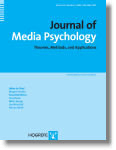
Journal of Media Psychology-Theories Methods and Applications
Scope & Guideline
Innovating Understanding through Media and Psychology.
Introduction
Aims and Scopes
- Media Effects and Audience Engagement:
Investigates how different forms of media affect audience behaviors, emotions, and cognitive processes. This includes exploring the psychological impacts of violent video games, social media interactions, and narrative structures. - Identity and Representation in Media:
Examines how media influences identity formation, self-perception, and societal roles. This includes studies on the portrayal of marginalized groups in media and the psychological implications of these representations. - Interactivity and Digital Communication:
Explores how interactive media, such as social media platforms and online games, affect communication patterns, social relationships, and self-disclosure. - Health Communication and Media Psychology:
Focuses on the role of media in shaping health behaviors and beliefs, including the effectiveness of health campaigns and the psychological impact of health-related narratives. - Moral and Ethical Considerations:
Addresses the moral implications of media consumption and production, investigating how media influences moral reasoning, ethical behavior, and social responsibility. - Emerging Media Technologies:
Investigates the psychological effects of new media technologies, including virtual reality, artificial intelligence, and immersive experiences, on user behavior and perceptions.
Trending and Emerging
- Mental Health and Media Interaction:
An increasing number of studies are exploring the relationship between media use and mental health outcomes, particularly in the context of social media and its effects on anxiety, self-esteem, and body image. - Impact of AI and Machine Learning on Media Perception:
Research investigating how artificial intelligence and machine-generated content impact user perceptions of credibility and bias is gaining traction, reflecting the growing relevance of technology in media psychology. - Social Justice and Media Influence:
There is a notable rise in studies focusing on the role of media in promoting social justice and moral understanding, particularly through narrative media and representation. - Interactivity in Digital Media:
Emerging research is increasingly focusing on the psychological implications of interactivity in media, such as video games and social media platforms, and how these experiences shape user behavior and identity. - Crisis Communication and Media Psychology:
The journal has seen a surge in studies examining the psychological effects of media during crises, including the COVID-19 pandemic, highlighting the role of media in shaping public perception and behavior.
Declining or Waning
- Traditional Media Effects:
Research focusing on classic media effects theories, such as cultivation theory and agenda-setting, appears to be less frequently published. This may indicate a shift towards more complex interactions involving new media forms. - Static Representations of Gender and Race:
Studies that analyze fixed stereotypes in media representations are becoming less common, possibly as researchers focus on more dynamic and intersectional approaches to identity. - Passive Media Consumption:
There is a noticeable decline in studies that investigate the effects of passive media consumption without considering interactive elements, as the field increasingly emphasizes user engagement and interactivity. - Longitudinal Studies of Media Use:
Although longitudinal studies are valuable, fewer are being published, suggesting a trend towards cross-sectional research that captures immediate effects rather than long-term implications. - Media Literacy as a Sole Focus:
Research dedicated solely to media literacy without integrating psychological perspectives is decreasing, indicating a broader trend towards interdisciplinary approaches that combine psychology with media studies.
Similar Journals
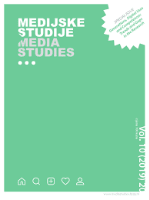
Medijske Studije-Media Studies
Connecting Global Perspectives on CommunicationMedijske Studije-Media Studies, an esteemed journal published by SVEUCILISTE & ZAGREBU, FAK POLITICKIH ZNANOSTI, is a pivotal platform in the field of communication studies and media research. Established in Croatia, this Open Access journal since 2010 features a diverse array of research articles that explore the multifaceted relationships between media and society. With its ISSN 1847-9758 and E-ISSN 1848-5030, the journal serves an international audience and is committed to disseminating innovative insights that drive media scholarship forward. Currently ranked in the Q3 category in Communication and Q4 in Computer Science Applications for 2023, it reflects its growing influence, capturing vital trends and analyses that resonate in both academic and practical realms. The journal's Scopus rank sits at #337 out of 511 in Social Sciences_ Communication, placing it within the 34th percentile, thus establishing its relevance in the global discourse on communication. Researchers, professionals, and students are encouraged to engage with this resource as it continues to forge connections between media studies and contemporary societal issues.
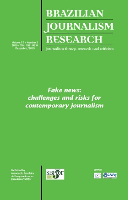
Brazilian Journalism Research
Illuminating the Future of News in BrazilBrazilian Journalism Research is a leading platform in the field of communication studies, focusing on the dynamic landscape of journalism in Brazil and beyond. Published by SBPJOR, this open-access journal has been committed to scholarly dissemination since 2005, facilitating a diverse array of research that informs both academic and professional practices. With an ISSN of 1808-4079 and an E-ISSN of 1981-9854, the journal explores critical issues within journalism, including media practices, policy analysis, and the social implications of news dissemination. Recognized in the Q3 quartile of Communication as per 2023, it ranks 324 out of 511 in the Scopus social sciences communication category, highlighting its growing reputation amidst an evolving field. The journal's commitment to quality research is further exemplified through its converged years from 2018 to 2024, which enables it to analyze contemporary trends and future directions. Researchers, professionals, and students alike are encouraged to access this journal to enrich their understanding and engagement with Brazilian journalism scholarship.
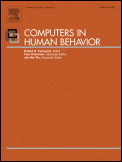
COMPUTERS IN HUMAN BEHAVIOR
Advancing Insights into Digital InteractionsCOMPUTERS IN HUMAN BEHAVIOR, published by Pergamon-Elsevier Science Ltd, stands as a premier journal in the interdisciplinary domain of human interactions with computing technologies. With a substantial impact factor and consistently ranking in the Q1 category across multiple fields—including Arts and Humanities, Human-Computer Interaction, and Psychology—this journal addresses crucial insights into how technology shapes human behavior and social interactions. Since its inception in 1985, it has evolved to encompass a breadth of studies that investigate emerging trends and challenges in digital environments, making it an essential resource for researchers, professionals, and students dedicated to advancing knowledge in this dynamic field. The journal, identified by its ISSN 0747-5632 and E-ISSN 1873-7692, is available for exploration through traditional access methods. With a focus on fostering scholarly discourse, COMPUTERS IN HUMAN BEHAVIOR continues to contribute significantly to the understanding of the increasingly complex relationships between humans and machines.

Communication & Society-Spain
Empowering Scholars to Shape the Future of CommunicationCommunication & Society-Spain, published by Universidad de Navarra, is an esteemed open access journal dedicated to advancing scholarship in the dynamic fields of communication and cultural studies. Since its inception in 1988, the journal has maintained a commitment to disseminating high-quality research that engages with contemporary issues and contributes to the evolving discourse around communication theories and practices. With a commendable Q1 ranking in both Communication and Cultural Studies categories, it stands as a prominent source for researchers and professionals alike, reflecting its robust presence in the academic community—evidenced by its Scopus rankings placing it in the top percentiles within both fields. The journal's scope encompasses diverse perspectives and methodologies, thereby fostering interdisciplinary dialogue essential for understanding the complexities of communication in society. With a publication history that spans from 2010 to 2024 and a ranking of #87 out of 1304 in Cultural Studies, our commitment to open access ensures that impactful research is readily available to all, promoting further scholarly engagement and innovation.

Journal of African Media Studies
Advancing Knowledge in African Communication.Journal of African Media Studies, published by INTELLECT LTD, stands at the forefront of communication research, focusing on the rich tapestry of media practices and theories across the African continent. Since its inception in 2011, this peer-reviewed journal has dedicated itself to exploring the intricate relationships between media, culture, and society in Africa, contributing significantly to the global discourse on communication. With an impressive impact factor positioning it in Q2 of the Communication category for 2023, and ranking #218 out of 511 in the Scopus Social Sciences Communication field, it offers a rigorous platform for scholars and practitioners alike. The journal's commitment to quality research is evident in its robust editorial process and its regular publication of articles that delve into contemporary issues affecting African media landscapes. Despite being a subscription-based journal, it attracts an engaged readership interested in accessing critical insights and advancing knowledge in media studies. As it converges its timeline towards 2024, Journal of African Media Studies continues to be an essential resource for researchers, professionals, and students eager to contribute to and explore the evolving narratives of African media.

Information Communication & Society
Advancing Knowledge in Communication and Information SciencesInformation Communication & Society, published by Routledge Journals, Taylor & Francis Ltd, is a premier journal in the fields of communication and library and information sciences, boasting an impressive impact factor and consistently high rankings in Scopus, including Rank #18/511 in Communication and Rank #14/280 in Library and Information Sciences for 2023. With its focus on the dynamic interplay between information technology and society, the journal serves as a vital platform for researchers, professionals, and students, facilitating the discussion of contemporary issues that shape digital environments. Since its inception in 2001 and converging from 2005 to 2024, the journal has maintained a rigorous peer-review process to ensure that it publishes high-quality research that contributes to ongoing debates and developments in the digital age. Although it does not offer open access, the journal's esteemed reputation and Q1 categorization underscore its impact within the academic community, making it an essential resource for anyone interested in the evolution of communication in the modern world.
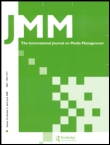
JMM-International Journal on Media Management
Pioneering Research at the Intersection of Media and ManagementJMM-International Journal on Media Management, published by Routledge Journals, Taylor & Francis Ltd, stands as a premier platform in the field of media management, offering insights into the evolving interface between media technologies and managerial practices. With an ISSN of 1424-1277 and an E-ISSN of 1424-1250, this journal strengthens its international presence through rigorous peer-review and cutting-edge research, positioning itself at the forefront of the academic discourse. The journal is recognized for its quality, reflected in its Q2 ranking in Communication and Q3 in Strategy and Management for 2023. With a significant impact factor derived from its respectable Scopus rankings—#141 in Communication and #249 in Strategy and Management—JMM not only contributes to the scholarly community but also serves as a crucial resource for professionals and students seeking to understand the complexities of media in a globalized context. Covering published research from 2009 to 2024, this journal creates a rich knowledge repository that embraces both historical perspectives and contemporary trends in the field.

JOURNAL OF CONSUMER MARKETING
Empowering Research in Consumer Marketing.The Journal of Consumer Marketing, published by Emerald Group Publishing Ltd, is a leading academic journal in the fields of marketing and business management, with a distinguished history spanning from 1984 to 2024. With an ISSN of 0736-3761 and an E-ISSN of 2052-1200, the journal maintains a prestigious position, classified in the Q1 category for Business and International Management and Q2 for Marketing as of 2023. It ranks notably in the Scopus database within the top 67th percentile for Business and International Management and the 58th percentile in Marketing, reflecting its high relevance and influence within the academic community. The journal seeks to publish innovative, empirical research and insights that contribute to a deeper understanding of consumer behavior and marketing strategies. With a commitment to academic excellence, it provides a vital platform for researchers, professionals, and students who are passionate about advancing the knowledge in consumer marketing as well as its practical applications in the industry. As you explore its pages, you'll find essential findings and discussions that bridge the gap between theory and practice in today's rapidly evolving marketplace.

Revista de Comunicacion-Peru
Connecting Scholars, Inspiring Change.Revista de Comunicación-Perú is a distinguished open-access journal published by Universidad de Piura, with a dedicated focus on communication studies. Since its inception in 2002, the journal has provided a vital platform for researchers, professionals, and students to disseminate knowledge and foster discourse in the field of communication. As of 2023, it proudly holds a Q1 classification in the Communication category and ranks impressively in Scopus, placing at #117 out of 1304 in Cultural Studies and #160 out of 511 in Communication, demonstrating its significant impact within the academic community. The journal’s scope encompasses diverse topics related to communication, cultural discourse, and media analysis, making it an essential resource for those seeking to explore contemporary issues in these areas. With a commitment to promoting scholarly exchange, Revista de Comunicación-Perú continues to play a pivotal role in shaping the communication landscape in Peru and beyond.

Review of Communication Research
Pioneering Open Access for Global Knowledge ExchangeReview of Communication Research is a prestigious open-access journal dedicated to advancing the field of communication studies. Published by REVIEW COMMUNICATION RESEARCH from its base in Madrid, Spain, this journal has established itself as a vital platform for scholarly discourse since its inception. With an impressive impact factor and ranked in the Q1 quartile of communication journals for 2023, it holds a commendable position, placing it within the top 13% of approximately 511 journals in the communication category on Scopus. Since becoming open-access in 2013, the journal has enabled researchers, professionals, and students to access high-quality research without financial barriers, thereby fostering a greater dissemination of knowledge and dialogue within the community. Covering a wide array of topics from communication theory to media studies, the Review of Communication Research continues to contribute significantly to the understanding and evolution of communication in today’s interconnected world. Researchers are encouraged to engage with and submit their findings to this influential journal to further enrich the scholarly landscape.